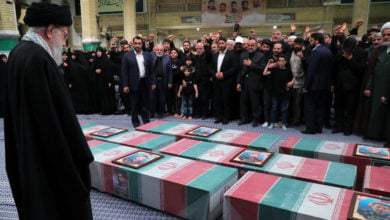A key question surrounding Iran’s June 12 elections and its aftermath has been the role that the United States and other imperialist powers have played in the unfolding crisis. To ignore this question is to close one’s eyes to the history of imperialist intervention in Iran and to disregard the U.S. record of wars, invasions and occupations still taking place in the region.
The Ahmadinejad government has accused Washington and London of unacceptable meddling in Iran’s internal affairs. Spokespersons for these powers have dismissed these accusations. Are these claims unwarranted paranoia? Are they an attempt on the part of the Islamic Republic to distract public opinion from the real issue?

CIA involvement in Iran goes back a long
way. Dr. Mohammad Mossadegh was
overthrown in a 1953 CIA-sponsored coup.
That is certainly the prevailing attitude of the U.S. corporate media, and others. Many liberals and progressives, including some who call themselves socialists, have echoed the same sentiments. They have typically dismissed any connection between events in Iran and U.S. objectives in the region. By skirting the issue, they have relieved themselves of the unpleasant task of explaining why all imperialist states and their mouthpieces in the big-business media, have so uniformly and enthusiastically endorsed the opposition.
To cite one liberal commentator among many, Reese Erlich, who traveled to Iran for the elections, acknowledges past involvements of the CIA in Iran, but dismisses the possibility of a significant U.S. role in the current crisis. Criticizing progressives who have denounced U.S. involvement, Erlich writes: “They cite the long history of U.S. interference in Iran and conclude that the current unrest there must be sponsored or manipulated by the Empire. That comes as quite a shock to those risking their lives daily on the streets of major Iranian cities fighting for political, social and economic justice.”
Erlich and others argue—correctly—that a movement drawing hundreds of thousands, even millions of demonstrators, cannot be entirely made up of U.S. agents or conjured up by the CIA, only to offer the faulty conclusion that imperialism is not playing a significant role.
Such an argument is premised on a caricature version of how imperialist interventions operate. Imperialist interventions are not carried out by hundreds of thousands of paid CIA agents pouring into the streets. Nor can the CIA just pull to make thousands come out in protest. CIA agents do not go out into a population distributing U.S. flags or propagating an overtly pro-U.S. political line. Such tactics would be quite transparent and ineffective.
Pro-imperialist movements and “color revolutions” rely on segments of the local population that stand to gain from a tactical alliance with U.S. imperialism—or at least perceive such an alliance to be in their best interest. By throwing its weight behind those forces—both through political propaganda and actual material support—U.S. imperialism advances its own interests.
What imperialism does is look for ways in which it can manipulate existing contradictions and foment unrest by magnifying problems, shortcomings and conflicts. Imperialism propagates misinformation, devises propaganda themes and disseminates them through its media outlets, agitates people, influences or buys off leaders, gets its agents on the ground, commits acts of sabotage, and more. The forces aligned with U.S. interests direct the energies and sentiments of parts of a population, some of whom may have legitimate grievances, toward goals that ultimately benefit only U.S. imperialism and the comprador bourgeoisie—the elements within the capitalist class willing to sell out the country to foreign capital.
Many liberal commentators have for years written critically about the U.S. destabilization campaign against Iran. Interestingly, now that this campaign is bearing fruit, many of these same commentators are enthusiastically defending the “pro-democracy” opposition movement.
The charge of U.S. involvement is based on very concrete history and decades of direct U.S. intervention, extending to the present. Has there been a sudden, unexplained change that would cause the imperialist establishment to stand on the sidelines and respect the Iranian people’s right of self-determination? Has the United States suddenly lost interest in maintain and expanding its hegemony over the Middle East—the most geostrategically important region in the world? If the decades of investment in the destabilization of Iran yield nothing in this period of post-election unrest, when is it supposed to pay dividends?
From the 1953 CIA coup to today
It is instructive to review the history of U.S. intervention in Iran. In his Cairo speech, President Obama acknowledged that “the United States played a role in the overthrow of a democratically elected Iranian government.”
Well, the CIA did not just “play a role.” It was the central organizer of the 1953 coup. The nationalist government of Dr. Mohammad Mossadegh had nationalized the Anglo-Iranian Oil Company, now known as British Petroleum. Iran had a parliamentary democracy and Mossadegh was the elected prime minister. The biggest political force on the ground was the Tudeh Party, Iran’s communist party.
The U.S. and British governments imposed economic sanctions on Iran, but when those failed to bring about regime change, they orchestrated the coup. The Shah was made monarch with absolute powers. He de-nationalized the oil and established a 25-year long partnership of brutal repression with the CIA and the Pentagon. Kermit Roosevelt, the intelligence officer who led the CIA coup, was rewarded with the position of vice president of Gulf Oil, which took over a portion of Iran’s de-nationalized oil fields.
It is not accidental that religious forces dominate Iranian politics today. Following the 1953 coup, all leftist and secular nationalist forces were systematically repressed, paving the way for the Islamic clerical establishment to take the leadership of the anti-imperialist movement.
The overthrow of the Shah in the 1979 revolution was a monumental setback for U.S. interests in the Middle East. Since then, U.S. policy toward Iran has been characterized the pursuit of the overthrow the Islamic Republic.
Washington fueled the Iran-Iraq war in the 1980s by first encouraging Iraq to invade Iran, then providing arms to both sides. From 1980 to 1988, the war killed nearly one million people, and both sides came out severely weakened. This set the stage for the first U.S. invasion of Iraq in 1991. U.S. attempts at regime change in Iran have continued in a variety of forms, with the present crisis presenting yet another opportunity for Washington to attain its long-sought goal.
The imperialist perspective
On May 16, 2007, the former U.S. ambassador to the U.N., John Bolton, said that a U.S. military attack on Iran would “be a last option after economic sanctions and attempts to foment a popular revolution had failed.”
On May 23, 2007, Brian Ross and Richard Esposito reported: “The CIA has received secret presidential approval to mount a covert ‘black’ operation to destabilize the Iranian government.”
On May 27, 2007, the London Telegraph reported: “Mr. Bush has signed an official document endorsing CIA plans for a propaganda and disinformation campaign intended to destabilize, and eventually topple, the theocratic rule of the mullahs.”
This year, on June 11, the day before the Iranian elections, neocon Kenneth Timmerman wrote that “there’s talk of a ‘green revolution’ in Tehran.” Timmerman also wrote: “The National Endowment for Democracy has spent millions of dollars promoting ‘color’ revolutions … Some of that money appears to have made it into the hands of pro-Mousavi groups, who have ties to non-governmental organizations outside Iran that the National Endowment for Democracy funds. “
Of course, at this time, we do not know the specific details of how CIA agents and assets have influenced the course of events since the June 12 elections. It usually takes months or years for details to come out. But it would be most irrational to assume that these agents took a break during the Iranian crisis when conditions were ripe for intervention.
The U.S. government has continued its support for the terrorist People’s Mujahedin of Iran (MKO). Maliki’s government in Iraq has attempted to close down their military camp, Camp Ashraf, north of Baghdad, but Washington has not let him. Among the demonstrators in Tehran were elements whose specific purpose was to cause maximum destruction. Iranian state TV aired interviews with captured agents of the MKO, who admitted having been instructed to set gas stations and buses on fire and destroy buildings.
The Iranian population is composed of peoples of many nationalities, with a variety of different languages and dialects. One of the areas of focus of the destabilization campaign, pursued in several regions, has been driving a wedge between these different nationalities.
Most successful among these campaigns has been the U.S.-supported terrorist Jondollah, active in the province of Baluchistan in southeast Iran. There is abundant production of drugs in U.S.-occupied Afghanistan. The desert regions in east and southeast Iran are infested with heavily armed organized groups involved in the transport of drugs through Iran to Europe.
The CIA basically contracted these drug gangs for acts of sabotage. Over the last few years, nearly a hundred people have been killed in Iran’s Baluchistan province by Jondollah bombings and armed attacks on Iran’s security forces, as well as civilians in mosques and buses.
Self-determination is a right
Imperialist intervention is not limited to the covert operations of intelligence forces. The Voice of America and the BBC have added Farsi language satellite television programming to their already existing radio broadcasts. Radio Farda, a U.S.-funded Farsi language radio station based in the Czech Republic, has been broadcasting propaganda against Iran for years.
Many Iranians, particularly the more privileged sectors, have access to these programs. VOA and BBC Farsi played a key organizing role for the post-election actions, dutifully announcing the time and place of planned demonstrations. They also provided live coverage by interviewing people who used their cell phones to call and transmit images. Demonstrators also relied on other sources, including monarchist satellite channels based in Los Angeles that did their best to broadcast information, and misinformation, to increase the size and intensity of the demonstrations.
There was no organized force on the ground mobilizing for the demonstrations. Satellite TV, and other forms of media, filled this gap. On June 15, three days after the elections, the U.S. State Department took the unprecedented step of “requesting” that the social networking site Twitter postpone a scheduled maintenance of its global network, which would have cut off service when Mousavi supporters were using Twitter to mobilize for street protests in Tehran. The bosses at Twitter quickly complied, and soon the protests were dubbed the “Twitter Revolution.”
Imperialist states have played a direct role in delegitimizing the elections and defending the opposition. President Obama called “on the Iranian government to stop all violent and unjust actions against its own people.” On June 19, the U.S. House voted 405-1 to support “all Iranian citizens who embrace the values of freedom, human rights, civil liberties and rule of law.”
Some imperialist leaders, including French President Sarkozy, have openly called the Iranian elections fraudulent, with no evidence to back their claim. George W. Bush stole the 2000 presidential elections after being fraudulently declared the winner in Florida by the Supreme Court, but the “great democracies” did not intervene then. The U.S. elections were considered an internal U.S. matter.
But the imperialists do not consider the Iranian elections an internal matter. They see it as their prerogative to preach democracy and human rights even while brutally occupying other countries against the will of the occupied people. Two of those countries, Iraq and Afghanistan, happen to be Iran’s neighbors.
The United States and other imperialist states have no right to intervene in Iran’s internal affairs. U.S. hands off Iran!






